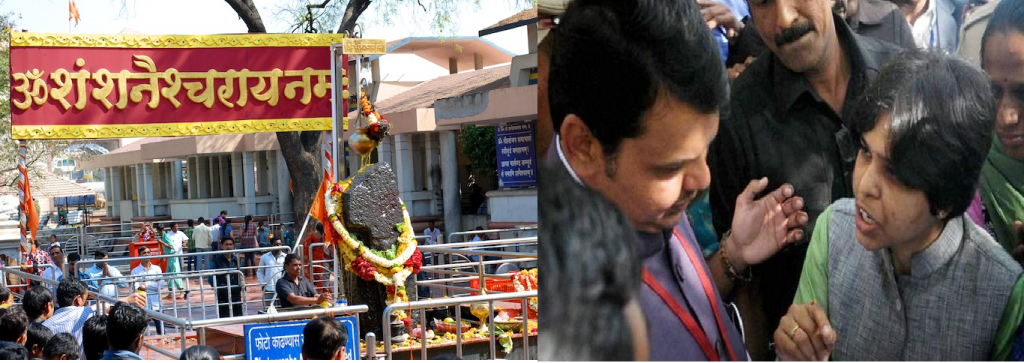A few months ago, it was alleged that a man had been killed in Uttar Pradesh because he had consumed beef. Even though proofs were conspicuously absent, the entire Hindu religion was assailed as being ‘Intolerant’ and ‘Communal’. A few days ago, a University student committed suicide, Once again it was the Hindu religion that was hauled over the coals for its casteist bias. Around the same time, there was a movement demanding that Sabrimala Temple in Kerala open its gates to women. When temple authorities resisted, the entire Hindu religion was described as ‘Inegalitarian’ and ‘Orthodox’. Parallely, there was much debate on menstruating women being allowed to enter temples. Hindu religion was once again censured as being ‘misogynist’. And now, the temple town of Shani Shingnapur finds itself in the middle of controversy. Feminists, Liberals, Seculars (FeLiSe) etc etc have laid siege to the temple town demanding that women be allowed to worship at the shrine. For years, Shani Shingnapur’s sole claim to fame has been the huge Shani temple, described as a Jagrut Devasthan (temple where deity resides in the idol), the conspicuous absence of thefts in the town and the fact that houses in the town did not have doors. With this new controversy, battle lines have been drawn between devout locals, Hindu activists and FeLiSe activists.
Unlike other religions, Hinduism has never been sexist, in the sense the word is understood today. Both women and men have had equal access to Gods, Godesses, rituals and festivals. Nonetheless, there have been traditions which have resulted in some rituals being carried out by men and other by women. For example, the Sabarimala shrine bars entry to womenfolk. Similarly, the Attukal Pongala festival bans entry of menfolk. Similarly, there is a Koovagam festival only for the transgendered. There are countless rituals which are presided over by men and many rites which are carried out by women. Far from many religions of book, Hinduism does not prescribe, nor does it proscribe. Therefore this argument of Hinduism being Sexist is utter nonsense. A more balanced approach leads one to believe that traditions that have evolved over thousands of years can not be wished away instantly. Instead of leading a morcha at a holy shrine, the Bhumata Brigade should have encouraged discussions with local people and tried to put across their view. By leading an army of women, the Bhumata Brigade has behaved like Muslim invaders and Christian missionaries of yore. They have scant understanding of the way faith and belief works. They are armed with their superior knowledge of law, an awareness of their rights and using these weapons they want to trample on the beliefs of local people, who in their minds are nothing better than noble savages. This smacks of ulterior and political motives.
Maharashtra CM, Devendra Fadnavis has displayed equanimity in dealing with the situation By asking the Shani Shingnapur Temple administration to reassess their guidelines, he has sent out the right message. Hinduism has been able to reinvent itself with changing times. Our temples, our rituals and our rites cannot and should not be held hostage to the past. This adaptibility and willingness to change makes Hinduism stand out from other religions. However, the pitch gets queered when people play unnecessary politics over issues. Our FeLiSe activists must remember that for every case of a woman not allowed on the platform at Shani Shingnapur, there exists an instance of women being barred from offering prayers at Haji Ali. For every case of a Hindu woman being treated unfairly by her in laws, there exists the option of polygamy in Islam. Social change is welcome and must be ushered in, but FeLiSe activists should not be selective in choosing social change, lest they want to be further exposed to charges of duplicity and hypocrisy.
References-
https://www.wheresmypandit.com/…/why-only-males-are-allowed…
http://timesofindia.indiatimes.com/…/articlesh…/50761249.cms
https://en.wikipedia.org/wiki/Shani
http://zeenews.india.com/…/shani-shingnapur-temple-entry-ba…
